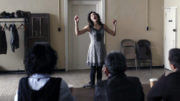In the acting profession, there’s no such thing as a self-made person. A successful actor is the product of many people working throughout the performer’s career to nurture skills, shore up weaknesses and put them in roles that suit their talents. Acting coaches, agents, managers, mentors and peers all have roles to play, and relationships are key. But of all of those, one of the most special relationships is between actors and casting directors, who can be among performers’ most ardent supporters, cheerleaders and advocates.
At the SAG Awards, when Claire Foy received The Actor for Outstanding Performance by a Female Actor in a Drama Series, she thanked The Crown’s casting directors first in her acceptance speech. “There are 250 — over 250 actors in the show, all of whom are cast by Nina Gold and Robert Sterne, who can I just say, really support and encourage and champion the actors that they cast. And we all need a champion,” she said. It was unusual, in that casting directors don’t often get a mention, but they can be one of the first people that help set an actor on the road that ultimately leads to that podium.
Most casting directors say they want performers to succeed, which is why one of the best ways to nurture that relationship is to do your job well.
Veteran character actor Lee Garlington, the chair of the SAG-AFTRA Los Angeles Local New Member Orientation Committee, said there’s one thing she always tells actors who are beginning their careers: “The single most important job you have when you’re starting out as an actor … is that your job is to make the casting director look good. Because when the casting director looks good in front of the producers, they are going to call you back again.”
Before you get that role, you have to nail the audition, and preparation is critical to a great audition, just as it is to a great performance. Being prepared doesn’t just mean knowing your lines, it also means doing your research before you even step through the door. If you’re auditioning for a television show that’s currently airing, watch the show. Learn the tone. If there are difficult-to-say technical, scientific or foreign words, make sure you master them. While you’re researching, take a moment to find out a little about the person you’re auditioning for. Find out what they’ve cast before and try to get a sense of their work and their tastes. And it doesn’t hurt to send a thank-you note when you’re done.
Even if you don’t get the job, if a casting director calls you in more than once, it’s likely they see something in you that they like.
“Actors that come in time after time for you, you talk to them, you begin to develop a relationship with them. Sometimes you become friends with them in the real world and sometimes you just learn about each other’s lives in small pieces and it’s a really nice feeling,” said casting director Gary Zuckerbrod.
But as important as it is to come prepared and with a strong sense of how you’re going to play the character, be flexible and open to direction, because you don’t have the whole picture.
“Every once in a while, you get an actor where you give them direction and they say, ‘I don’t see it that way.’ And I’m like, ‘OK, fine. Thanks.’ I’m the eyes and ears of [the producers]; I do know what’s going through their heads. I do know what they’re looking for,” said Zuckerbrod.
Relationship-building doesn’t end with only those who can benefit an actor’s career; the way a performer behaves around colleagues and co-workers can have an impact as well. Casting director Debra Zane said professionalism matters in the entertainment industry — just as it does in every industry.
“In any career, a person needs to build relationships … because everyone has long memories and people will champion you if you’re worth fighting for.”
Casting directors can be a performer’s most influential advocate; there’s no one better equipped to pair up an actor with the role they were born to play.
“It’s important to know we are really rooting for performers,” Zane said.
So, when you hit the big time, and you’re standing at the front of the room with a statue in hand, don’t forget to thank the people who helped you get there.
© 2017 SAG-AFTRA. Reprinted with Permission. First appeared in the Spring 2017 issue of SAG-AFTRA Magazine.





